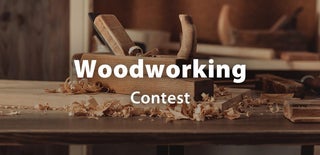Introduction: Carved Drinking Horn
Every person eating tons of meat and drinking even more beer is either a dwarf or a viking. So what do all those people need? A drinking horn.
This instructables will cover all steps I did for my drinking horn. This includes some simple carving and metalwork and excludes the proces of preparing the horn for whatever usage you desire.
If I will make a standard for it in the future, the building process of that will be added here.
14-6-2013: The instructions for my socket are added.
This instructables will cover all steps I did for my drinking horn. This includes some simple carving and metalwork and excludes the proces of preparing the horn for whatever usage you desire.
14-6-2013: The instructions for my socket are added.
Step 1: Materials
- 1 cow horn (size as desired)
- carving tools
polyurethane coating,don't just use a coating. Use something natural like bee wax.- Copper tube
- Materials for socket, I used some forged metal curles I got from a friend.
Step 2: Carving
Horncarving is not the same as wood carving as I was told. I did neither of them, so I was new to the entire proces.
I started with an internet search for a picture which suited me. I found a picture of God Hephaestus which I liked. With a little help of Photoshop and a thick black permanent marker I created a black and white image suitable for my carving skills. The picture was scanned and lines were added so I could draw it on the horn.
I made a mistake with the drawing of the grid on the horn. I started with a line parallel to the horn fibres. Between all lines was 1 cm of space, which resulted in a rhombus. Due to this shape the drawing looked strange. My advise is to stay perpendicular and parallel to the horn fibers, this results in a better looking drawing. I resolved the problem by doing some hand drawing where the rhombus shape was doing strange things to my drawing. The initial drawing was done with pencil, but before I started carving I redid everthing with a permanent marker because I wiped out the line when I started to carve.
Carving horn was more difficult than I expected, the horn is very hard. However, when the outlines where carved, layers of horn were easy to remove due to the layered structure of a horn. I added some pictures of my work in progress. When you do this for the first time I suggest to rely on your own skills which will improve during the carve. This is the way I managed to get better results than I expected.
Depending on your horn, your carvings reveal a black or a white surface. When you look inside the horn you can make a good guess where it will be white and where it will be black. When placing your drawing you can take this into account as I did.
I started with an internet search for a picture which suited me. I found a picture of God Hephaestus which I liked. With a little help of Photoshop and a thick black permanent marker I created a black and white image suitable for my carving skills. The picture was scanned and lines were added so I could draw it on the horn.
I made a mistake with the drawing of the grid on the horn. I started with a line parallel to the horn fibres. Between all lines was 1 cm of space, which resulted in a rhombus. Due to this shape the drawing looked strange. My advise is to stay perpendicular and parallel to the horn fibers, this results in a better looking drawing. I resolved the problem by doing some hand drawing where the rhombus shape was doing strange things to my drawing. The initial drawing was done with pencil, but before I started carving I redid everthing with a permanent marker because I wiped out the line when I started to carve.
Carving horn was more difficult than I expected, the horn is very hard. However, when the outlines where carved, layers of horn were easy to remove due to the layered structure of a horn. I added some pictures of my work in progress. When you do this for the first time I suggest to rely on your own skills which will improve during the carve. This is the way I managed to get better results than I expected.
Depending on your horn, your carvings reveal a black or a white surface. When you look inside the horn you can make a good guess where it will be white and where it will be black. When placing your drawing you can take this into account as I did.
Step 3: Making the Horn Drinkable.
When I bought the horn it was already 'drinkable' because it was desinfected. However, everything you put into the horn will taste like wet cow, which is not the bad part, the smell is worse.
There are several ways of making your horn drinkable, the choice depends on what you want to drink out of it. I desided I liked the look of steam coming out of the horn, so I needed something that could withstand hot drinks. This means I had to coat it with a polyurethane resin. I poured the resin in the horn, turned the horn while holding it at an angle until the resin touched every spot in the horn. The resin cured while holding the horn upside down, with the excess resin I also coated the outside.
The resin I used was not approved food safe, but when hardened it will not give toxins anymore (I hope) so I used it anyway. When you do the same, make sure you know what you are doing. I will drink once, maybe twice from this horn, that is why I used it anyway. However, the first time I drank from it, I think the resin wasn't cured 100%, the day after I had to stay home.
Plans for the future:
Soften an existing polymer glass and make it fit my horn. This way it will be able to hold hot drinks and it is foodsafe. Every help with this is welcome.
There are several ways of making your horn drinkable, the choice depends on what you want to drink out of it. I desided I liked the look of steam coming out of the horn, so I needed something that could withstand hot drinks. This means I had to coat it with a polyurethane resin. I poured the resin in the horn, turned the horn while holding it at an angle until the resin touched every spot in the horn. The resin cured while holding the horn upside down, with the excess resin I also coated the outside.
The resin I used was not approved food safe,
Plans for the future:
Soften an existing polymer glass and make it fit my horn. This way it will be able to hold hot drinks and it is foodsafe. Every help with this is welcome.
Step 4: A Copper Edge
I wanted to make it my horn and try some new things. Giving the horn a copper edge was one of those things. It started with a normal copper tube which I cut and made flat on an anvil. A little bit of hammering to get in round my horn and it was time for the rivets.
The rivets were made from a small copper rod. I took about 1 cm and made one end 'round' with a hammer. This would be for the inside of the horn. 4 Of these rivets were used. A advise to start in the middle of the old tube en work your way out. I did it the other way around but my piece of copper turned out to be to big so there are some big holes between the copper and the horn. Still I am happy with them. When the rivets are in place put the inside of the horn on the rivet on the home-made anvil and start hammering your rivet until it fastened the copper and looks good.
As you can see in the first picture, I tried to solder the ends of the copper. I didn't succeed and I gave up. The burned horn only smells but the horn can handle the looks.
The rivets were made from a small copper rod. I took about 1 cm and made one end 'round' with a hammer. This would be for the inside of the horn. 4 Of these rivets were used. A advise to start in the middle of the old tube en work your way out. I did it the other way around but my piece of copper turned out to be to big so there are some big holes between the copper and the horn. Still I am happy with them. When the rivets are in place put the inside of the horn on the rivet on the home-made anvil and start hammering your rivet until it fastened the copper and looks good.
As you can see in the first picture, I tried to solder the ends of the copper. I didn't succeed and I gave up. The burned horn only smells but the horn can handle the looks.
Step 5: The Horn Socket
Allthough I said in the beginning of this build that I would make a socket for it, in the end the plans were changed. As you can see in the final step I had put the horn on some small copper buckets. I liked the looks of it so no socket was necessary. That was until this forged material came to me. 2 Days later the socket was finished.
Step by step instruction:
Step by step instruction:
- Start with some ideas.
- Choose your idea.
- Weld the curls to the plate.
- Paint the metal after cleaning it.
- Put it under the horn.
Step 6: Enjoy
The most important task. Enjoy you newly made drinking horn. I enjoy it every day laying on my nightstand next to the wooden alarm clock made in one of my other instructables.











